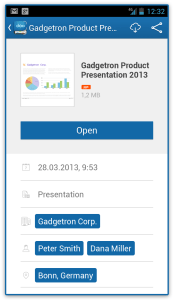German consumer document management startup doo has launched an Android app to extend the access points it offers users. The app, now live on Google Play, supplements its existing Mac OS X and Windows 8 desktop apps. An iOS app is also in the works (due “shortly”, says doo).
The Android app lets doo users view and search documents stored elsewhere which they have linked to their doo account. Documents can also be downloaded locally to their Android device.
Doo’s document management software works by getting users to point it to the digital folders and accounts (such as email accounts) where documents are stored. The app then creates “smart tags” for documents, based on their content, document type, creation date and so on, to make it easier for the user to search for and locate the right one.
Doo’s software can grab document data via optical character recognition if required (enabling it to support paper document management, as well as PDFs). Its cloud can also be used for document back-up, as well as syncing access across devices.
Here’s how doo describes the new Android app:
People want to take their documents wherever they go, regardless of where they were initially created and stored. doo for Android augments doo for OS X and Windows 8 by giving our users a way to do so. Our first mobile app is currently a document reader that, when linked with a doo account, allows users to access documents from all their sources: their local hard drive, a second internal drive, an external drive, Google Drive, Dropbox and email accounts.
With on-the-go access, users nonetheless benefit from the ease and power of doo’s tag-based search. All tags applied to their documents by doo’s intelligent algorithms are automatically transferred to their Android devices. Selective download lets users individually decide, which documents to download to their Android device.
Doo landed a Series A round last June, when it launched its public beta, which took its total funding to $10m.
